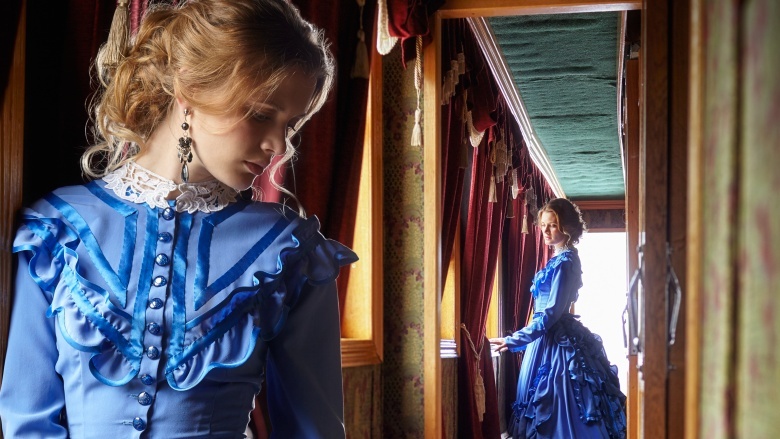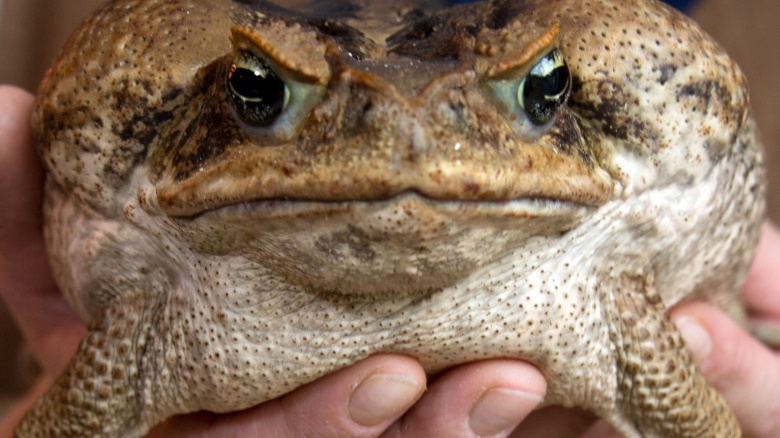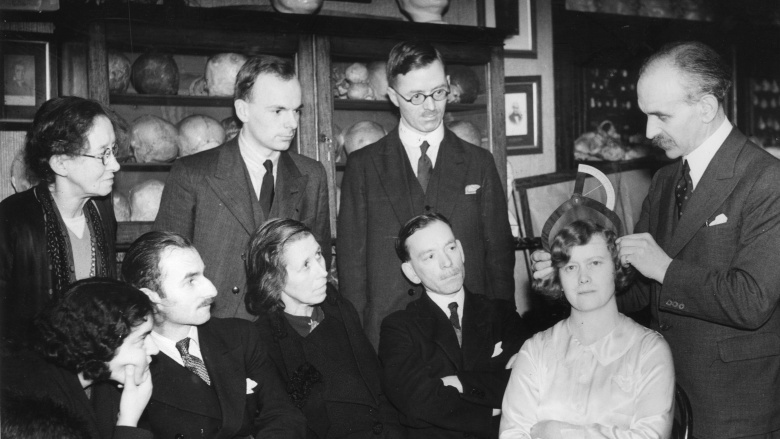Easiest Jobs In The World
Jobs are hard. Whether you're a kindergarten teacher or a firefighter, most grown-up jobs come with their fair share of challenges and seemingly unending stress. But what if we told you that it doesn't have to be this way? There are dozens of jobs out there requiring little to no actual skill, and they pay real money.
Lady's companion
So, it's the Victorian era, 1837 to 1901. Things are changing fast, but women are still in a bit of a tricky spot. If you were of a certain social standing (not poor), there were only a couple jobs you could hold down while still holding onto your respectability. One of them was to become a lady's companion, and it was a profession reserved typically for women who were in the middle class but who were still appropriately well-bred, probably those who had lost other sources of income.
As Victorian-era jobs go, this one was a pretty good deal, as long as you could swallow your pride and face working for someone else. Lady's companions were hired by upper-class women who needed company and had no real friends who'd hang out with them for free. As a lady's companion, you could expect to keep your mistress company during meals, play games and read with her during the day, and go with her to the park, the local opium den, or whatever else it was that lonely, rich Victorian women occupied their days with. If you were interested in such a job, you advertised the old-fashioned way: in the classified section of the newspaper. Potential companions would describe their skills in things like singing and playing instruments, sewing, and embroidery, along with specifying whether they wanted a salary or just a place to live.
The biggest difficulty with being a lady's companion was facing up to the fact that you needed to become a servant to support yourself. As long as you weren't proud, you spent your days hanging out with the upper class and dressing in all the latest fashions. True, you might have to play checkers over and over again, but it was better than getting beaten at your factory job, or hung from the ceiling in a bucket (yes, that really happened), all for wages a fraction of what you'd get if you were a man.
Bear leader
It's rough, being royalty. If you were really, really lucky, you could get a job like that of the bear leader, giving you access to things like clean towels and water that wasn't filled with cholera and death, while dodging all the responsibility and headaches. It all hinged on one of the great responsibilities of young noblemen: embarking on their Grand Tour. The Grand Tour was essentially a dream vacation, where young nobles would leave England to travel the Continent, experience the foreign countries they'd eventually be dealing with for business (and pleasure), and get exposed to art, culture, foreign foods, and probably some foreign diseases. The idea dates back to the mid-17th century, and it gradually came to be applied to anyone who wanted a career in the arts, too. They needed to learn from the masters, and no one had masters like Italy.
Those diseases we mentioned? No one really wanted their wide-eyed young son to come back with any of those, so guides called bear leaders were sent along on the trip. Their official job was to provide a sort of running commentary on all the incredible sights they were seeing, give their charges a history lesson on the places they visited, and keep them out of the brothels or, at the very least, keep them from throwing up on their fancy shoes after a long night of drinking. The tour typically lasted three years, and the little party on wheels would cover most of Europe by carriage (later, they'd head mostly to major cities in Italy, which would still be acceptable by our standards). Who got this particularly epic job? Most were members of the clergy, almost all were hoping to secure a place in the household and inner circle of the noble they were accompanying, and some were actual professionals and scholars that had experience in the field. Most of them were also incapable of actually controlling any part of this situation. It probably only took a few months before they threw in the towel and joined in the festivities.
Toad doctors
You'd think we'd be heading back into that shadowy Middle Ages for this one, but we're sticking with the 18th century. The belief that toads contained healing powers dates back to ancient Rome, unfortunately for the toads. Over the centuries, people did a lot of really nasty things to toads before eating them or drinking what was left of them, and in the 18th and 19th centuries English toad doctors were dedicated medical professionals (and we're using that term loosely) who used only toads as medicines and cure-alls.
If you had scrofula (which is a particularly unsightly combination of tuberculosis and skin disease) and you couldn't get the king to touch you, you'd head to a toad doctor. There was such a high demand for toad doctors from scrofula patients that there was actually a Toad Fair, set up in Dorsetshire. At the yearly gathering, toad doctors would rip the legs off a toad just for you, then put them in a bag for you to wear around your neck until the scrofula disappeared. You might, on occasion, just be given a whole toad in a bag to hang in your house until it died. Then you would wear it in the bag. Preparation is everything, when it comes to medicinal toads.
Toad doctors cured other things with toads, too. In spite of the fact that they had their naysayers, traveling toad doctors sold their toads as cures for rheumatism (burn them and tie the ashes in a bag around your neck), rabies and epilepsy (take a dose of "toad venom"), and urine-based problems (take a few spoonfuls of powdered toad). If someone were to complain of excessive bleeding, toad doctors claimed to be able to make the blood stay in a person's body where it belonged, simply by scaring it into submission with a toad impaled on a piece of wood and left to dry. They were different times.
Phrenologist
Some science is brilliant and insightful. Other parts of science are a stretch at best and downright wacky at worst. Phrenology is the one of the wackiest, and it was the belief that the lumps, bumps, and dents on a person's skull reflected the strengths and weaknesses of that person's brain and character. The phrenologist was adept at feeling a person's skull and telling them everything they needed to know about themselves, based on a widely accepted map of the areas of the scalp that corresponded to the character. There were sections for things like destructiveness, hope, spirituality, and combativeness. All in all, there were said to be 21 different emotional attributes and 14 intellectual attributes that could be read from your lumpy head. Phrenologists knew exactly who you were and who you could be just from feeling your scalp.
Crazy, right? The whole thing was insanely popular both in Europe and in the U.S. Phrenologists were consulted when couples wanted to know if they were compatible, when young entrepreneurs wanted to know if they had what it took to be successful in business, and even to find out if a person was hiding a moral or social dark spot under their cheery exterior. Job applicants would sometimes be sent to a phrenologist to see if they were right for the position, and in the mid-19th century, a female phrenologist named Lydia Fowler (nee Folger) became the second woman to graduate from medical school, the first female professor of medicine, and a massive hit on the lecture circuit. At the time, this was no pseudoscience. Being a phrenologist was a big deal, and the successful ones wrote books, gave lectures, and had huge practices.
Phrenology fell from favor in the early 20th century, and the Fowlers' American Phrenological Journal was last published in 1911. They had always had their naysayers, but they still left a mark on our culture today. Ever tell someone they need to have their head examined? That's a leftover phrase from phrenology, along with calling something low-brow or high-minded. It's too bad phrenology has been disproven. It'd be a handy skill to have on a first date.
Town criers
Got a good, loud voice and like to hear the sound of it? You might be channeling the spirit of the town crier, a position with roots back to the 11th century. Criers were heralds, responsible for bringing the news (and the decrees of royal overseers) to the public. Also called bellmen, they'd get the attention of the townsfolk by yelling "oyez!" (from the French for "hear ye"), then they'd read the news to the gathered crowd. Announcements were usually then posted somewhere prominent, which is also why so many newspapers still call themselves "The Post." The oldest depiction of a town crier in medieval history is in the famous Bayeaux Tapestry, where he's shown delivering news of the invasion of William the Conqueror in 1066.
There were traditionally a few other duties the town crier performed, including making sure there were no fires still burning after curfew, arresting any trouble-makers they came across, and then hanging out near the stocks to announce to the world what they'd done to end up there. If having all your misdeeds proclaimed to your neighbors by a man ringing a bell and wearing tights isn't enough to stop you, nothing will. They also provided play-by-play commentary at hangings and other sorts of executions, and they were probably the last thing that a lot of people heard.
Town criers were paid by the shout, and even though they usually brought bad news they were protected by strict law. Doing anything to a town crier meant you were going down for treason, and that same town crier you punched would get the last laugh as he narrated your hanging. Perks of the job! And it's one you can still get. Town crier competitions still happen, and the English city of Chester still has a town crier reading the news on Tuesday and Saturday, all summer long. Yes, they still wear tights.
Knocker-uppers
Stop giggling. As the world (and in this particular case, Britain), started to become industrialized, people were suddenly required to report to their jobs on time. They went from their hungry farm animals waking them to needing to make sure they were up, on their feet, and in the street at a certain time, but the alarm clock app couldn't yet be found in the App Store. How could you guarantee you were going to be to work on time when you couldn't afford a clock?
Enter the knocker-uppers. These enterprising individuals were paid weekly to make their rounds and knock on your door or tap on your window to wake you up in the morning. Earn your weekly wage and dodge the hard factory labor? Not a bad deal.
Being a knocker-upper did have its difficulties, though. You had to make sure you were only waking up the people who were paying you. You didn't want to accidentally wake any neighbors because you couldn't give away your services for free. Most knocker-uppers came up with their own ways of waking their clients, from tapping on windows with a long stick to using a pea shooter to take a few shots at those same windows. Easy and fun, right? It lasted for a surprisingly long time, only dying out in most big cities around World War II, but still practiced in small towns until the 1970s. Electricity and alarm clocks meant the end of this easy job. It probably also ended a lot of gossip about the things spotted so early in the morning.
You might have noticed that everything thus far has been an easy job from historical times. Fret not, lazy people of today. There are plenty of breezy jobs to be had in our modern world too, as you'll learn by reading on ...
Medical research volunteer
When any new medication or treatment option is released in the medical community, the preliminary drug trials are largely dependent on clinical testing. Here's where you come in: the doctors need lab rats for this phase, but as the medication is intended for humans, they really need actual humans to willingly volunteer their bodies to science.
You're probably wondering why anyone would do that. Isn't it dangerous? Well, if you remember anything about high school science, aside from how bad that fetal pig smelled, you'll remember that the basis of any experiment is having a control group. If you volunteer to participate in a clinical trial, there's always the chance that you could be one of the lucky ones that gets a placebo and a fat check. The baseline established in clinical trials is reliant on a group of testers given placebos to help distinguish reactions or side effects induced by paranoia from those likely caused by the medication.
Or, perhaps you have a rare disease where the only treatment available for you is through some groundbreaking research that has not yet been formally accepted as a treatment option. For you, this could be the difference of life and death, but for most, it could simply be an easy way to make some extra cash.
Payments vary on the level of danger associated with each study. So, if you're risking death and you luck out with the placebos, you could walk away with thousands of dollars. However, you won't find medical research volunteer jobs while you're playing around on LinkedIn. They're usually found where real American entrepreneurs congregate: Craigslist. But if you're looking for something a little less risky, maybe you'd like something sweeter ...
Ice cream tester
It sounds like something a second grader would write in a "What I want to be when I grow up" project, but ice cream testers exist. In the world of frozen dessert treats, John Harrison is considered a master in his field. Harrison has made thousands of dollars for his unique skill, ad his taste buds are even insured by Edy's Ice Cream for $1 million.
A day in the life of a master ice cream tester is pretty sweet: taste dozens of flavors of ice cream and assess them for quality control prior to shipment. There's no catch — all you do is taste the flavors and write some notes to ensure you're shipping out a high-quality product. Harrison says he tastes with his eyes, too, so if an ice cream just looks gross, it will never get the stamp of approval.
Ice cream testers have a process similar to the sommeliers of viticulture; you know, the snobs who swirl their wine around and smell it before they drink it? That's a lot like what professional ice cream testing is like. First, the flavors are assessed for visual appeal, then tasted and analyzed for a number of attributes including aroma, bouquet, and top notes. Before tasting, the ice cream is set out to soften for some minutes, for ideal texture. Then using a gold-plated spoon, Harrison takes a bite, swirls it around in his mouth for a bit to coat every possible taste bud, and spits it out to assess the aftertaste. That's actually how delicious ice cream flavors are made — they all start with somebody's spit.
Hotel tester
Yep, this job is exactly what it sounds like. Hotel testers are paid to travel the world and test out hotels for various levels of customer satisfaction. Imagine a luxurious California King set with the finest Egyptian cotton sheets. It's your job to determine the comfort level of your sleep. It's almost like being a Yelp reviewer, only you're employed by a specific company that is actually paying you for reviewing that those sheets totally weren't the thread count they promised you.
Traveling under the facade of "regular tourist," hotel testers are completely under cover (literally, when testing out the bed). You are required to maintain your secret identity for the integrity of your reviews. But the bed isn't the only thing you'll be testing when you stay for free. You also assess the pricing, location, Wi-Fi speed, temperature, pools, dining experiences, and overall cleanliness. In addition to staying for free, you can get paid for each of your reviews. So maybe you don't get paid a fortune, but you're still getting paid to stay in nice hotels and surf the web. How is the not the new American Dream?
Egg donor
Egg Donor: a job so easy, actual chickens can do it. Though for real, the human version of this job requires moderately more responsibility than Camilla and her friends in the hen-house, assuming that you can remember to show up to your doctor appointments, give yourself hormone injections, and don't mind sitting through a minimally invasive surgical procedure at the end of the process.
Healthy women aged 22-30 are eligible to sell their eggs for shocking amounts of cash. For example, if you donate through the Growing Generations company, you'll get $8,000 for the first egg, and $10,000 for every egg thereafter. Sure, there may be little kids running around your planet that you actually mothered with your own consent, but you'll never have to change a diaper, give birth, or attend a single Wiggles concert.
Life coach
Life coaches are there to help you get your chaotic garbage pail of a life together. Your life coach is an objective observer of all of your life choices who can steer you in the right direction.
Traditionally, life coaches are retirees over the age of 55 with the career and life experiences necessary to credit their expertise in the field. But it's not just for retirees — anyone can become a certified life coach after the successful completion of a six-month online program. Complete the program, and real people will be ready to pay you the big bucks for telling them what to do.
According to data from the Universal Life Coaching Institute, the average salary is almost $48,000 annually, with the top salaries hitting damn near $275,000 a year. A life coach is essentially a sponsor for people not in AA. They're a shoulder to cry on, a number to call, a listening ear, and are dedicated to soliciting advice to help you achieve personal and professional satisfaction.
Bathroom break coordinator
Most people in the workforce have the freedom to use the bathroom whenever Mother Nature demands it, or whenever they need an easy place to hide and look at social media. Some jobs, however, are unable to give their workers flexibility with their breaks, and are required to employ a bathroom break coordinator to develop a productive schedule for workers.
Yes, you can paid for telling grown men and women when they can and can't go potty. But while it sounds silly, some industries absolutely need such an organizer. Bus drivers for instance, can't just pull the whole show to the side of the road to pop a squat. Instead, they have "comfort station coordinators" working behind the scenes to find the opportune time for drivers to safely relieve themselves.
There's big money to be had in this job too. In Seattle, for example, experienced bathroom czars are pulling in close to six-figures — while it may not be that much elsewhere, work your way up the toiletry ladder and those riches could be yours. So cut the crap and start scheduling the crap!
Netflix tagger
If you possess a certain set of skills that are limited to binge-watching terrible movies on Netflix, this is the job for you. A Netflix tagger actually gets paid for firing through the entire catalog and assigning painfully specific genres and tags to each title, varying from "emotional independent dramas for hopeless romantics," to "Latin-American forbidden love movies." The watchers also objectively assess and dissect each title for specific content such as "darkness of humor" or "perilous situations." In short, Netflix taggers are the secret behind the perfect algorithm of guessing what you might want to watch, based on your viewing history.
Watchers are forbidden by the company to reveal their salaries but, on average, view 20 hours of content per week. Honestly, even at minimum wage, you're still getting paid to Netflix and ... not chill. Not on company time, anyway.
Deer urine farmer
The urine industry is much bigger than you think. In fact, for some hunters and farmers, it's a way of life. Deer urine farming is particularly lucrative, with commissions ranging from $93,000 to over $300,000 a year, according to DeerFarmer.com. Yes, all of those beautiful commissions are paid for a product typically squirted all over the woods for nothing.
Yes, internet. People buy this. Lots of them too. Deer urine acts as a natural lure for hunters who are desperate to bring home some delicious venison. It's like how lures work in Pokemon Go, only real. Deer urine farming can be a tricky business, because certain seasons of the year yield disproportionate amounts of urine, but now, farmers have developed freeze-drying technology to preserve yields, transcending the limits of weather and tricky old Mother Nature, and making us giggle like schoolkids because people are walking around with freeze-dried pee in their pockets.














